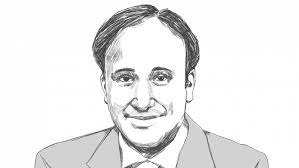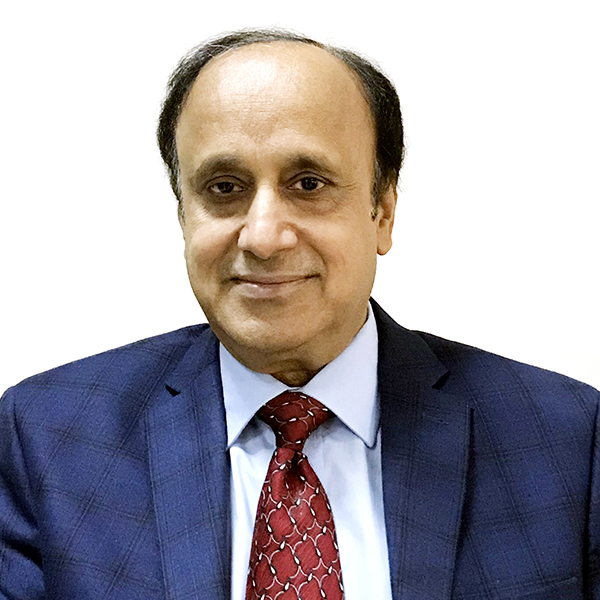TBS Report
01 October, 2023, 11:10 pm
Last modified: 01 October, 2023, 11:13 pm
Stop financing budget deficit by printing money to check inflation, Sadiq Ahmed tells BB
In his presentation, Dr Sadiq covered three key areas of macroeconomic management: inflation control, exchange rate and balance of payments management, and reforming the banking sector

Sketch: TBS
The most important policy measure to contain inflation would be to stop financing the budget deficit through money creation, Dr Sadiq Ahmed, former director of the World Bank and vice chairman of the Policy Research Institute (PRI), has recommended to the central bank.
Inflation control has become absolutely essential, and the government must move swiftly to bring down inflation to the normal 5-6% rate, Sadiq Ahmed stressed at a consultation meeting with Bangladesh Bank Governor Abdur Rouf Talukder on 27 September.
The governor had invited him along with Ahsan H Mansur, executive director of PRI, to consult the current macroeconomic situation and appropriate macroeconomic management in Bangladesh. Finance Secretary Md Khairuzzaman Majumder, deputy governors Kazi Saidur Rahman, Abu Farah Md Nasser, Sajedur Rahman Khan, and Noorun Nahar were present at the meeting held at the central bank headquarters.
In his presentation, Dr Sadiq covered three key areas of macroeconomic management: inflation control, exchange rate and balance of payments management, and reforming the banking sector.
He stressed that the idea that inflation is caused and sustained by the Ukraine war is not correct. The war had an immediate inflationary impact in the March-June period of 2022. Since July 2022, global commodity prices have fallen substantially. According to IMF data, the weighted average of all global commodity prices fell by 30% in USD terms between July 2022 and June 2023, which more than fully compensated any effect of the Bangladesh currency depreciation on inflation.
He also said the price gouging by monopoly type big trading houses may have jacked up prices of essential commodities, but the fundamental reason for the current high inflation is excess demand pressure from money creation by the Bangladesh Bank to finance budget deficit and interest controls that have increased demand for domestic credit. Flushed with excess liquidity, prices of assets, commodities and USD have all been bid upwards, which has fuelled inflation.
So, the most important policy measure would be to stop financing the budget deficit through money creation, noted Dr Sadiq. This must be combined with an increase in the domestic interest rate to lower the demand for credit.
He suggested that instead of targeting the interest rate, the Bangladesh Bank should target inflation and must continue to reduce domestic credit until such time that inflation has been brought down to the desired level of 5-6%. This would be a temporary measure and once inflationary pressures and adverse inflationary expectations have been stabilised, credit growth may be restored to the normal level to support investment and GDP growth.
Sadiq Ahmed observed that the finance ministry will need to do some belt tightening. The primary candidate would be subsidies. There is little justification for budgeting Tk1 trillion in subsidies when there is very little fiscal space owing to a severe revenue constraint. The prime minister has already given a policy directive to eliminate all energy subsidies, which accounts for the bulk of the subsidies. Also, there is little justification for continuing with export and remittance subsidies if the exchange rate is market-determined, which is the official policy of the central bank.
Dr Sadiq observed that the government can mobilise substantial revenues by reforming the state-owned enterprises (SOEs). These SOEs are incurring huge losses and the burden is shifted to the Treasury. Over the years, the government has invested some 17-18% of GDP in SOEs. By earning at 10-12% return on these SOEs, the government can earn 1.8-2% of GDP from SOEs. In this regard, he shared a policy research paper on SOE reforms with the finance secretary.
Moving on to the subject of balance of payments and exchange rate management, Dr Sadiq pointed out that the current pressure on the exchange rate was long pending. Between FY2006 and FY2020, the real effective exchange rate (REER) appreciated by a whopping 70%. This is the primary reason why non-RMG exports have stagnated in Bangladesh. This poor management of the exchange rate was becoming unsustainable, and corrections became essential. The depreciation of the taka between FY2021 and FY2023 has partially corrected the sharp appreciation but there is still some way to go.
He strongly advised the need to maintain the flexibility of the exchange rate to boost exports and remittances while curbing imports. He advised against import controls and instead use demand management to lower the pressure on the foreign exchange.
Dr Sadiq argued that if the exchange rate is market determined then the actions against money changers are not justified. The open market rate is an indication of the demand for foreign exchange not met by the banking sector at the announced rate. This demand will also fall once inflation is brought down and credit becomes more expensive. Non-market interventions are not needed.
Regarding banking sector reforms, Dr Sadiq explained that in his view there are three major challenges that need to be addressed. The first is the need to address the challenge of non-performing loans (NPLs) and restructured loans. The total of these distressed loans stood at Tk3.3 trillion (22.6% of total outstanding loans and 8.4% of GDP) at end December 2022. This situation is clearly unsustainable, and some tough measures will have to be taken. Many of these actions relate to banking sector governance, which are political in nature and require strong support from the highest level of political leadership. The main reason why foreign banks have a tiny share of distressed assets is because they are free from domestic political interventions. Without these governance reforms, sustained progress in improving the health of the banking sector will not be possible, he emphasised.
There are two dimensions of the NPL problem: the stock of NPL and the flow of NPL. The stock of NPL is the existing amount of NPL while the flow concerns potential NPL from new loans. The stock problem cannot be solved without first addressing the flow problem, he said.
Handling the flow problem requires a distinction between public and private banks. Historically, the public banks have been plagued with governance problems. The government must agree to remove all political interventions in lending and loan recovery, require the public banks to perform as normal commercial banks, and they should earn a profit. No budget transfer should be possible to bail out these banks. The board and management must be professionally appointed, and the banks should be subject to comply with all prudential norms under the supervision of the Bangladesh Bank.
For private banks, no political intervention should be possible, and the central bank should tighten and fully enforce board governance quality. Hundred percent compliance with Basel 3 prudential norms including risk weighted capital and provisioning must be enforced.
Regarding loan restructuring, now that the Covid-19 effects are gone, all loan restructuring should be halted, and loan repayment standards should be fully enforced. No new loans should be possible for enterprises that do not fully comply with debt servicing schedule.
The second problem in the banking sector, observed Dr Sadiq, is the variable portfolio quality by banks. The latest BB Financial Stability Report identified some nine poor-performing banks (four state-owned commercial banks and five private banks) who have a large share of distressed assets, lower-than-norm risk weighted capital base, lower-than-required loan provisioning, and weak loan recovery performance.
Dr Sadiq emphasised that the deterioration in the performance of these banks must be reversed immediately. The first step should be to stop all new lending until these banks are fully compliant with all prudential norms within a specified time period. Failing this, the private banks would be candidates for mergers through a transparent and financially strong process. For public banks, the government should decide whether to privatise them or give them a longer time frame to improve performance through wholesale changes in performance-based management.
The third banking sector challenge according to Dr Sadiq is the sharply declining growth of domestic deposits. He expressed a deep concern that the steep decline in the rate of growth of deposits from 22% in FY2011 to only 7% in FY2023 would spell trouble for the ability of the banking sector to finance future growth of the Bangladesh economy.
In his view, two factors have contributed to this: first, the return to holding deposits has sharply fallen due to low deposit rate, high inflation, and depreciation of the taka. Holding dollars and non-financial assets like land, apartments, etc is much more profitable. Second, the fear of NBR intrusion in banking transactions and associated BB restrictions on deposit holdings and usage has adversely affected the confidence of many depositors who prefer holding cash and USD rather than bank deposits.
According to Dr Sadiq, the solution to this problem is threefold. First, BB must allow more flexibility in lending rates, which will allow banks to offer better rates to depositors. Second, BB must reduce inflation, which will increase the real return on deposits and also reduce exchange rate depreciation. And third, the BB must act as a firewall between NBR and deposit holders. The banking sector is built on confidence and comfort level, and nothing should be done to shake that confidence. NBR investigations based on evidence of wrong-doing where access to bank records is necessary should follow the due process of law. The confidentiality of bank accounts and bank records must be preserved to protect depositor interest and confidence in the banking system.







